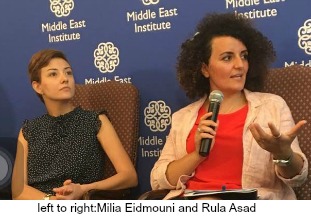 On Wednesday, June 29th, APN intern Rebeca Feldman attended a panel discussion on the
role of Syrian women journalist-activists. Following is her report:
On Wednesday, June 29th, APN intern Rebeca Feldman attended a panel discussion on the
role of Syrian women journalist-activists. Following is her report:
The Middle East Institute hosted an event entitled: Media Activism Amid Civil War: The Role of Syrian Women Journalists. The event, moderated by Kate Seelye, Senior Vice President of the Middle East Institute, featured three speakers with vastly different backgrounds and experiences of the Syrian media. However, all three were unanimous in their belief in a free and empowered media for a democratic Syria, which can be achieved by making the media a voice of the people, representing all classes, communities, and genders.
Caroline Ayoub, Co-founder and Project Manager of SouriaLI [Syria is Mine Radio], focused on how her organization is using the voice of the people to generate public change. Her organization brings together Syrian nationals both in Syria and throughout the world who collaborate through a media organization that is equally comprised of men and women employees. When asked to discuss an interesting radio segment that her organization has produced, Ayoub chose to focus on a popular cooking show. According to Ayoub, “food gathers people together…. people need to get to know each other and get to know their similarities.”
Directly following Caroline was Rula Asad, Co-founder and Executive director of Syrian Female Journalists’ Network. Asad focused on the positive aspects of the Syrian Civil War, saying that the war is serving as a catalyst for important change because after all, “out of conflict comes opportunity.” She emphasized that Syria’s civil war is a good starting point to empower female journalists, achieve “gender justice” and provide a platform for groups who otherwise are not represented in Syria’s public arena such as the LGBTQ+ community.
The final speaker was Milia Eidmouni, is a journalist and co-founder Syrian Female Journalists’ Network. Although she works for the same organization as Asad, her perspective was different, largely reflecting the fact that she is not based in Syria, but works for a Syrian organization that has become global with the help of the Internet. Eidmouni works with Syrian female refugees in Jordan and Lebanon. Commenting on Asad’s idea of positive change coming from the civil war, Eidmouni shared narratives of women that she works with.
During the question-and-answer portion of the event, someone asked the panel if they believed Western media coverage accurately depicts the refugee crisis in Syria. The three speakers were unanimous in their distaste for the way refugees, in particular female refugees, are being represented. The stereotypical picture of a woman fleeing with a crying child is not the image that needs to be presented, they said. Instead, the narratives of the women should be told. Ayoub commented that female refugees “are not just numbers, there are stories behind the numbers.” It’s important to note the impressive work refugees are doing in other countries once they leave Syria. The refugees are not helpless; instead they need programs such as those provided by NGOs in Jordan in order to gain the tools to succeed.